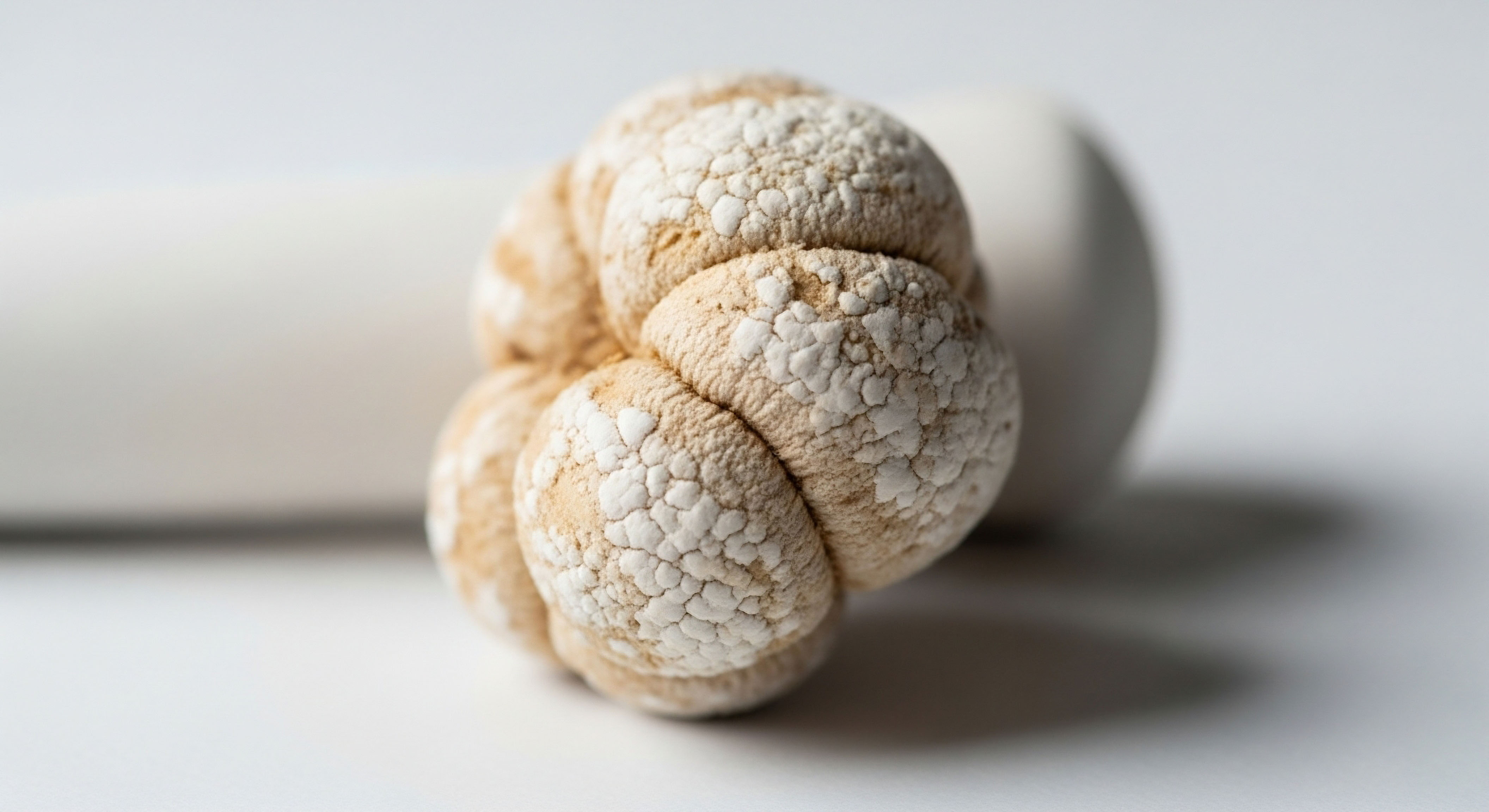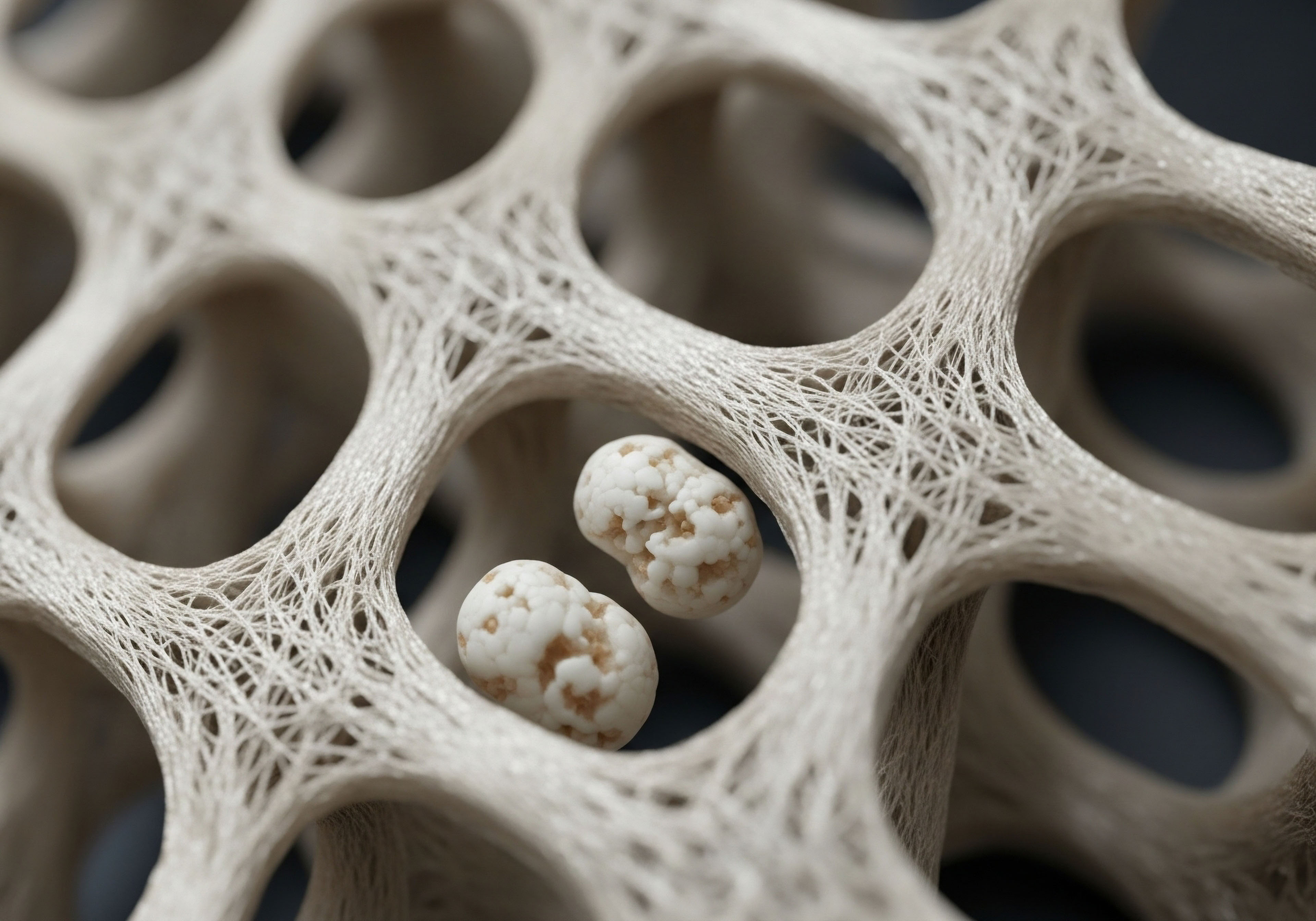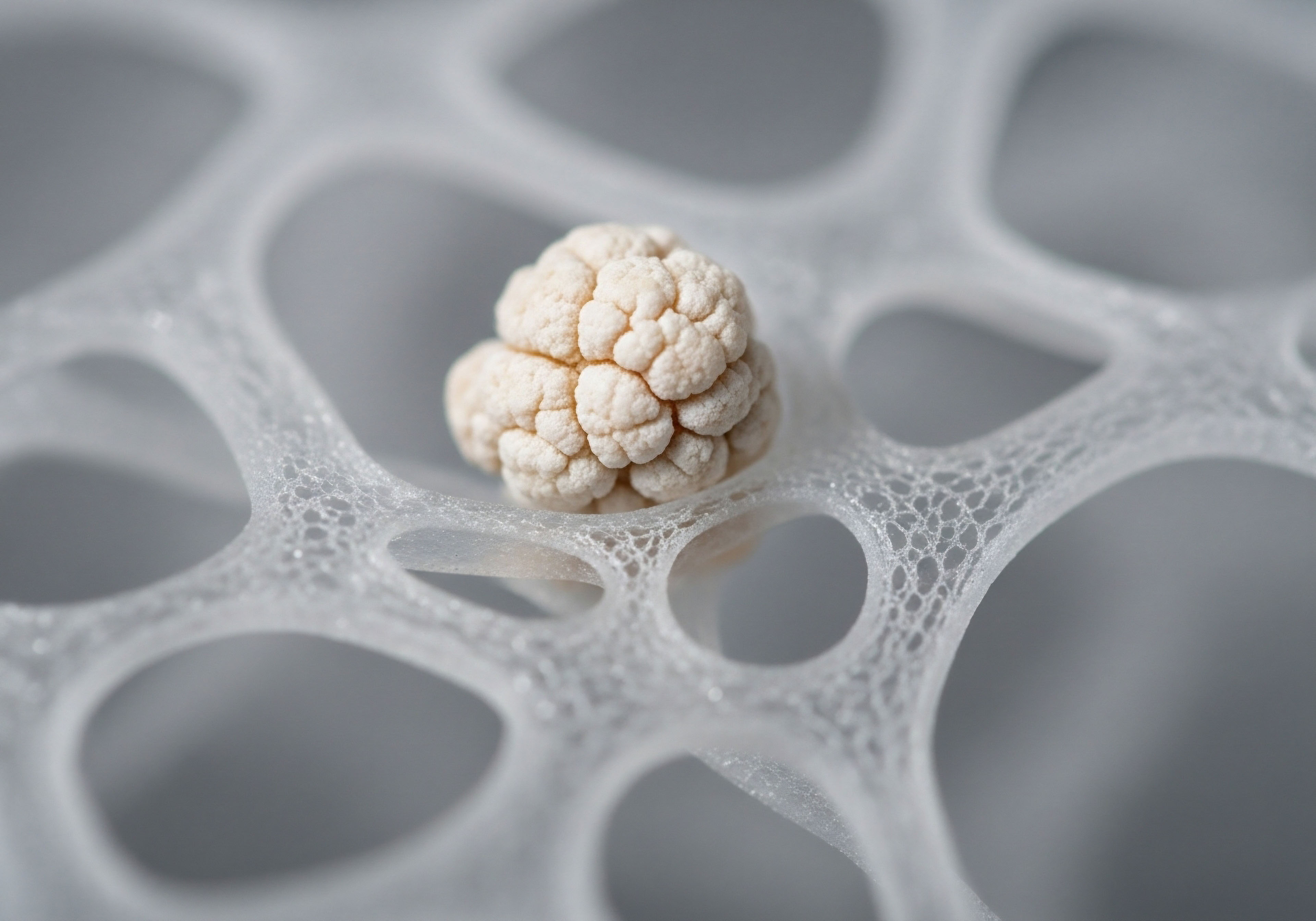

Fundamentals
The feeling can be one of profound internal betrayal. Your body, the one vessel you have, seems to have declared war on itself. You experience the fatigue, the shifts in weight, the mental fog, and you know something is deeply misaligned.
This experience is a common starting point for individuals discovering they have Hashimoto’s thyroiditis, a condition where the immune system mistakenly targets the thyroid gland. Your thyroid is the body’s master metabolic regulator, a small gland at the base of your neck that dictates the pace of virtually every cell and system. When its function is compromised by an autoimmune process, the effects ripple outward, touching every aspect of your well-being.
Understanding this process begins with shifting our focus from the neck to the gut. An immense portion of your immune system resides within the complex, dynamic world of your gastrointestinal tract. This is where your body encounters the outside world most intimately, processing nutrients and defending against pathogens.
The connection between the health of this internal ecosystem and the function of your thyroid is so profound that it has been termed the “gut-thyroid axis.” This axis is a bidirectional communication highway, where signals from the gut directly influence thyroid function, and thyroid hormones in turn affect gut health.
An imbalance in the gut microbiome, a state known as dysbiosis, can precipitate a confused and overactive immune response, which is the very foundation of an autoimmune condition like Hashimoto’s.
The health of the gut is inextricably linked to the function of the thyroid gland through a complex communication network known as the gut-thyroid axis.
The core of the issue in Hashimoto’s is one of mistaken identity. The immune system, designed to attack foreign invaders, incorrectly identifies thyroid proteins ∞ specifically thyroid peroxidase (TPO) and thyroglobulin (Tg) ∞ as threats. It then creates antibodies to target and destroy them.
The question of whether we can pacify this autoimmune assault leads us directly back to the gut. The logic is compelling ∞ if the immune system’s command center is in the gut, then restoring order to the gut microbiome may be a foundational step in re-educating the immune response. This is where the potential role of specific probiotic interventions comes into view, offering a strategy to modulate the very environment where the autoimmune process may be originating.


Intermediate
To appreciate how probiotic interventions might influence thyroid autoimmunity, we must first examine the mechanism of intestinal permeability. The lining of your gut is designed to be a highly selective barrier, allowing for the absorption of digested nutrients while preventing undigested food particles, toxins, and microbes from entering the bloodstream.
In a state of dysbiosis or inflammation, the tight junctions between the cells of this lining can loosen. This creates a condition of increased permeability, often called “leaky gut.” When this barrier is breached, substances that should remain contained within the gut can pass into systemic circulation, triggering a heightened state of immune alert.
The immune system sees these escaped molecules as foreign invaders and mounts an inflammatory response. Over time, this chronic, low-grade activation can lead to the development of autoimmunity in genetically susceptible individuals.

The Immunomodulatory Role of Probiotics
Probiotics are live microorganisms that, when administered in adequate amounts, confer a health benefit on the host. Their primary action in this context is to help restore balance to the gut microbiome and reinforce the integrity of the intestinal barrier. Specific strains of bacteria appear to be particularly effective at this immunomodulatory task.
- Lactobacillus species These are some of the most well-researched probiotics. Strains like Lactobacillus reuteri and Lactobacillus rhamnosus have been shown to help regulate the immune response, promoting the activity of T-regulatory cells, which are crucial for teaching the immune system to tolerate the body’s own tissues.
- Bifidobacterium species This group, including strains like Bifidobacterium longum and Bifidobacterium breve, plays a vital role in maintaining the gut barrier. They produce short-chain fatty acids (SCFAs) like butyrate, which serves as the primary fuel source for the cells lining the colon, helping to keep the intestinal barrier strong and intact.
- Spore-based probiotics Organisms like Bacillus coagulans are delivered as dormant spores that can survive the harsh environment of the stomach. They become active in the intestines, where they contribute to microbial diversity and can help crowd out pathogenic bacteria.

How Might Probiotics Lower Thyroid Antibodies?
The proposed mechanism for reducing thyroid antibodies is indirect yet biologically plausible. By restoring a healthier gut environment, probiotics may reduce the overall inflammatory burden on the immune system. A stronger intestinal barrier means fewer immune-triggering molecules entering the bloodstream. A more balanced microbiome helps to calm the overactive immune signaling that characterizes autoimmunity.
This process helps to downregulate the systemic inflammation that fuels the attack on the thyroid gland. Some studies suggest that this improved immune modulation could, over time, lead to a reduction in the production of TPO and Tg antibodies. It is important to see this as a long-term strategy aimed at addressing a root cause of immune dysregulation.
Probiotic interventions aim to fortify the gut barrier and rebalance microbial communities, thereby reducing the inflammatory signals that drive autoimmune thyroid conditions.
It is also clinically relevant to note that some research indicates probiotic supplementation can improve the absorption and stabilize the need for levothyroxine (T4), the standard medication for hypothyroidism. This suggests that by improving overall gut health, probiotics can enhance the efficacy of conventional treatment. The table below outlines some key probiotic types and their functions relevant to the gut-thyroid axis.
| Probiotic Type | Primary Mechanism of Action | Potential Relevance to Thyroid Health |
|---|---|---|
| Lactobacillus Strains | Produce lactic acid, modulate immune cell activity, compete with pathogens. | May help calm autoimmune responses by promoting T-regulatory cell function. |
| Bifidobacterium Strains | Produce Short-Chain Fatty Acids (SCFAs), reinforce the gut barrier. | Strengthens intestinal integrity, reducing the “leaky gut” phenomenon that can trigger autoimmunity. |
| Synbiotics (Probiotic + Prebiotic) | Provide beneficial bacteria along with the fiber (prebiotics) they feed on. | Shown in some studies to improve TSH levels and support overall thyroid function. |


Academic
A granular analysis of the clinical evidence surrounding probiotic use for Hashimoto’s thyroiditis reveals a complex and evolving picture. While the preclinical rationale is strong, human clinical trial data has yielded mixed results, underscoring the intricate nature of the gut-immune-thyroid relationship. The central question is whether targeted microbial interventions can translate from mechanistic theory into clinically significant reductions in thyroid autoantibodies, such as anti-thyroid peroxidase (TPOAb) and anti-thyroglobulin (TgAb).

Examining the Clinical Trial Data
Recent systematic reviews and meta-analyses provide the highest level of evidence, and their findings call for a carefully calibrated perspective. A 2022 meta-analysis that pooled data from randomized controlled trials (RCTs) involving hypothyroid participants found that supplementation with multi-strain probiotics, predominantly containing Lactobacillus and Bifidobacterium, did not produce a statistically significant change in TPOAb, TgAb, or thyroid hormone levels (TSH, fT3, fT4).
The only statistically significant outcome observed was an improvement in constipation symptoms, which, while beneficial for patient quality of life, is separate from the primary autoimmune pathology.
In contrast, other analyses have shown more specific effects. A 2024 meta-analysis looking at both hypothyroidism and hyperthyroidism found that while probiotics and prebiotics did not significantly alter TSH or fT4 levels, they did cause a modest but statistically significant reduction in TSH-receptor antibody (TRAb) levels.
TRAb is the antibody characteristic of Graves’ disease, another form of autoimmune thyroid disease. This finding suggests that the immunomodulatory effects of probiotics might be specific to the particular autoimmune pathway being targeted. The immune response in Hashimoto’s (a Th1-dominant process) is different from that in Graves’ disease (a Th2-dominant process), which could explain the differential impact of a gut-based intervention.

What Is the True Therapeutic Target of Probiotics?
These divergent findings suggest the therapeutic target of probiotics in thyroid autoimmunity may be indirect. The intervention may not act as a direct “antibody-lowering” agent in Hashimoto’s. Instead, its primary benefit may lie in modulating the underlying gut environment that permits autoimmunity to flourish. The mechanisms for this are multifaceted:
- Reduction of Lipopolysaccharide (LPS) Translocation ∞ Dysbiosis, particularly an overgrowth of gram-negative bacteria, increases the burden of LPS, a potent inflammatory endotoxin. By improving gut barrier function, probiotics reduce the amount of LPS entering circulation, thereby lowering a major trigger for systemic inflammation and immune activation.
- Production of Short-Chain Fatty Acids (SCFAs) ∞ A healthy microbiome ferments dietary fiber into SCFAs like butyrate, propionate, and acetate. These molecules are critical signaling agents that promote the differentiation of naive T-cells into T-regulatory cells (Tregs). An increase in Tregs is fundamental to restoring immune tolerance and suppressing autoimmune reactions.
- Enhancement of Micronutrient Absorption ∞ The gut microbiome is essential for synthesizing and absorbing key nutrients vital for thyroid function, including selenium, zinc, and iron. Correcting dysbiosis can improve the nutritional status that supports both thyroid hormone production and immune health.
The clinical evidence suggests that probiotics may not directly lower thyroid antibodies in Hashimoto’s but rather work to restore gut barrier integrity and rebalance immune-regulating microbial metabolites.

Could the Lack of Effect Be a Matter of Specificity?
The lack of a consistent, strong signal in clinical trials for Hashimoto’s may also reflect a lack of specificity in the interventions studied. Most trials use general, multi-strain probiotic formulas. It is biologically plausible that the immense complexity of the human microbiome, which contains trillions of organisms, requires a more personalized approach.
The future of this therapeutic avenue likely depends on identifying specific microbial signatures associated with Hashimoto’s and then deploying targeted probiotic or synbiotic therapies designed to correct that specific dysbiotic pattern. The table below summarizes the findings from recent meta-analyses, illustrating the nuanced results.
| Study Outcome | Meta-Analysis on Hypothyroidism (2022) | Meta-Analysis on Thyroid Disease (2024) |
|---|---|---|
| TSH Levels | Clinically nonsignificant change. | No significant alteration. |
| fT4/fT3 Levels | No significant change. | No significant alteration. |
| Thyroid Antibodies | No significant effect on TPOAb or TgAb. | Significant reduction in TRAb (Graves’ disease). |
| Clinical Symptoms | Significant improvement in constipation. | Not a primary endpoint. |
Therefore, while the current evidence does not support the use of general probiotics as a primary treatment to lower thyroid antibodies in Hashimoto’s, it does support their role in a broader, systems-based approach. By improving gut health, reducing systemic inflammation, and enhancing nutrient absorption, these interventions help to create a biological environment less conducive to autoimmunity. This foundational work is a critical component of a comprehensive protocol aimed at managing the condition and improving overall physiological resilience.

References
- Knezevic, J. Starchl, C. Tmava Berisha, A. & Amrein, K. (2020). Thyroid-Gut-Axis ∞ How Does the Microbiota Influence Thyroid Function? Nutrients, 12(6), 1769.
- Ghareghani, M. Reiter, R. J. Zibara, K. & Farhadi, N. (2018). Latitude, Vitamin D, Melatonin, and Gut Microbiota in Autoimmune Thyroid Diseases. Melatonin Research, 1(2), 115-134.
- Fröhlich, E. & Wahl, R. (2017). Microbiota and Thyroid Interaction in Health and Disease. Trends in Endocrinology and Metabolism, 28(8), 559-569.
- Jurewytz, J. & Grenda, A. (2022). Are probiotics, prebiotics, and synbiotics beneficial in primary thyroid diseases? A systematic review with meta-analysis. Annals of Agricultural and Environmental Medicine, 29(4), 536 ∞ 543.
- Zhang, J. Zhang, Y. & Li, C. (2024). Effect of probiotics or prebiotics on thyroid function ∞ A meta-analysis of eight randomized controlled trials. Frontiers in Endocrinology, 14, 1321459.

Reflection
The information presented here provides a map of the intricate biological terrain connecting your gut to your thyroid. Understanding these connections is a profound act of self-awareness. It shifts the perspective from one of passive suffering to one of active participation in your own health.
The data shows us that while a single intervention may not be a simple solution, the body operates as an integrated system. Your daily choices regarding nutrition and lifestyle send constant signals to this system, influencing the environment where health is either supported or diminished.
This knowledge is the starting point. It equips you to ask more insightful questions and to view your body with a new level of appreciation for its complexity. The path toward reclaiming vitality is a personal one, built on a foundation of understanding your unique physiology.
Consider how these biological concepts resonate with your own lived experience. What aspects of your health story now appear in a new light? This reflection is the first step in translating scientific knowledge into a personalized wellness protocol that works in concert with your body’s innate intelligence.

Glossary

immune system

gut-thyroid axis

thyroid function

immune response

gut microbiome

probiotic interventions

intestinal permeability

dysbiosis

probiotics

lactobacillus

produce short-chain fatty acids

bifidobacterium

thyroid antibodies

gut health

tpoab

autoimmune thyroid

gut barrier

short-chain fatty acids




